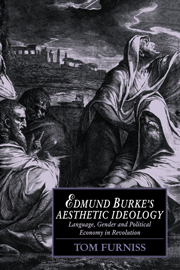Book contents
- Frontmatter
- Contents
- Acknowledgements
- Note on texts
- Introduction
- PART ONE AESTHETICS FOR A BOURGEOIS REVOLUTION
- PART TWO REFLECTIONS ON A RADICAL REVOLUTION
- 5 The genesis of the Reflections: resisting the irresistible voice of the multitude
- 6 Stripping the queen: Edmund Burke's magic lantern show
- 7 A revolution in manners: chivalry and political economy
- 8 Reform and revolution
- 9 Imaginary constitutions and economies
- 10 Speculation and the republic of letters
- Notes
- Index
9 - Imaginary constitutions and economies
Published online by Cambridge University Press: 18 February 2010
- Frontmatter
- Contents
- Acknowledgements
- Note on texts
- Introduction
- PART ONE AESTHETICS FOR A BOURGEOIS REVOLUTION
- PART TWO REFLECTIONS ON A RADICAL REVOLUTION
- 5 The genesis of the Reflections: resisting the irresistible voice of the multitude
- 6 Stripping the queen: Edmund Burke's magic lantern show
- 7 A revolution in manners: chivalry and political economy
- 8 Reform and revolution
- 9 Imaginary constitutions and economies
- 10 Speculation and the republic of letters
- Notes
- Index
Summary
According to J. G. A. Pocock, the term ‘political economy’ in the eighteenth century encompasses commentary on the administration of public revenue, ‘the emerging science of “the wealth of nations”’, and ‘a more complex, and more ideological, enterprise aimed at establishing the moral, political, cultural and economic conditions of life in advancing commercial societies’. I wish to show that Burke's criticism of radical thought, and especially of the Revolution's financial policy, is driven by the apprehension that it threatens to annihilate the very conditions of political economy in all these senses. Indeed, Pocock can argue that ‘it is not possible to read Burke's Reflections with both eyes open and doubt that it presents [the Assembly's creation of assignats on the basis of confiscated church property] – and not assaulting the bedchamber of Marie Antoinette – as the central, the absolute and the unforgivable crime of the Revolutionaries’ (Virtue, Commerce, and History, p. 197). But if the Revolution is therefore inimical to the Whig order in Britain (which was for Burke the only possible model of a successful commercial society), its challenge disconcertingly arose, as Pocock puts it, ‘within the conditions that order made possible’. In responding to this challenge, Burke inevitably used a language which ‘revealed tensions within Whig society and its ideology’ (Virtue, Commerce, and History, pp. 194–5).
If Burke's aesthetics are shaped by economic and political paradigms, his politics and economics are endowed with affect through what we might call an ‘aesthetic ideology’.
- Type
- Chapter
- Information
- Edmund Burke's Aesthetic IdeologyLanguage, Gender and Political Economy in Revolution, pp. 220 - 242Publisher: Cambridge University PressPrint publication year: 1993



